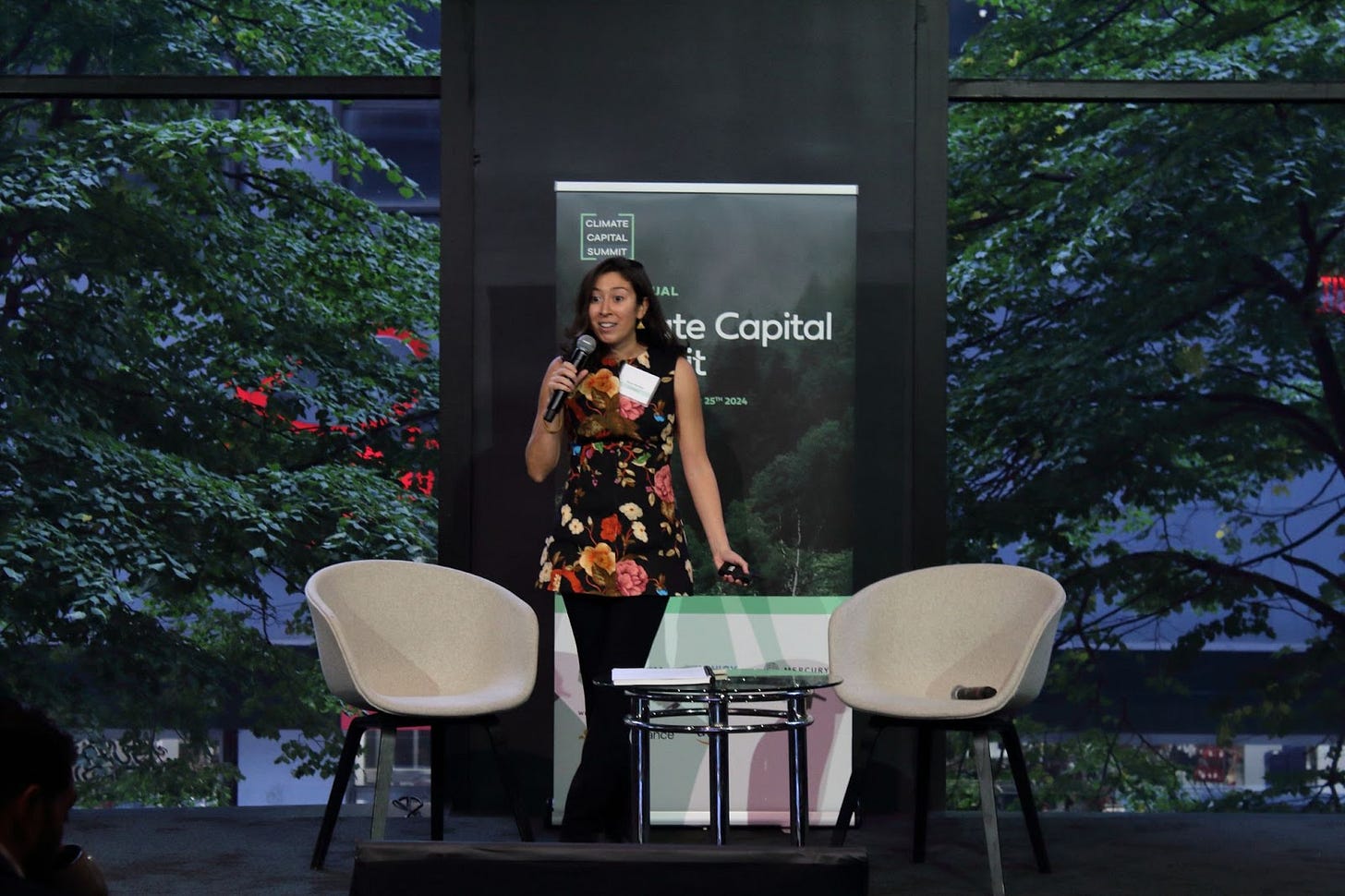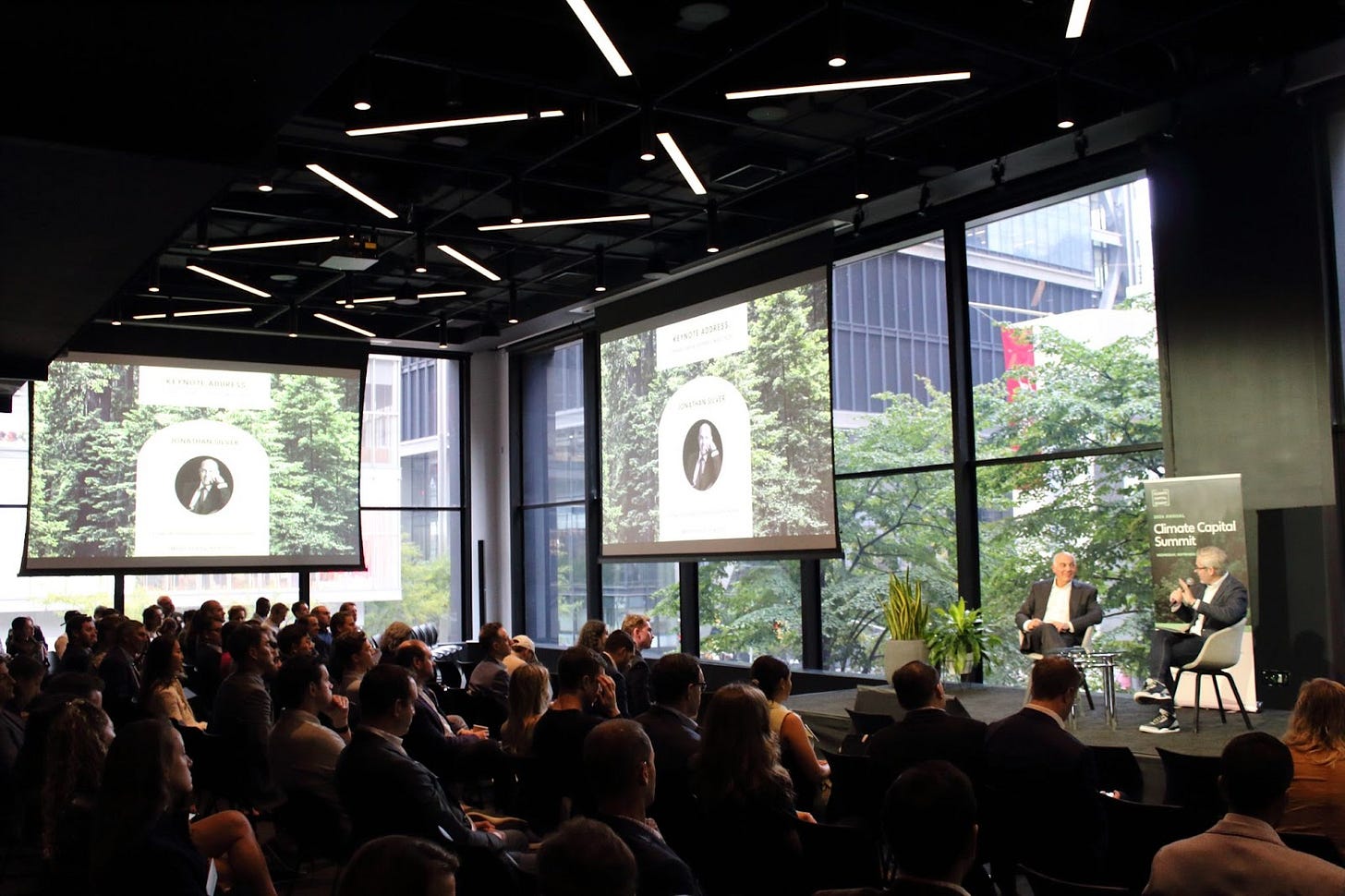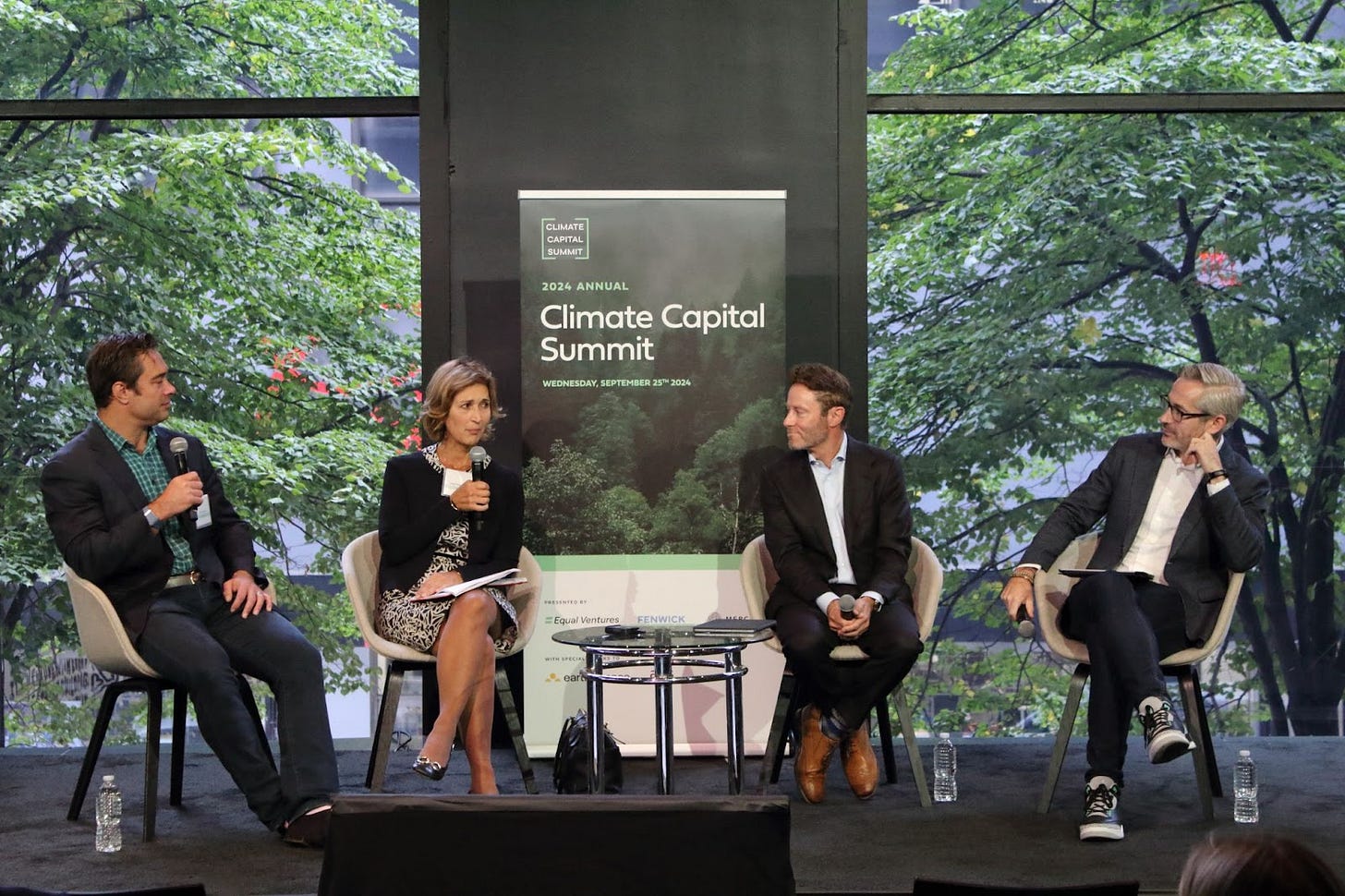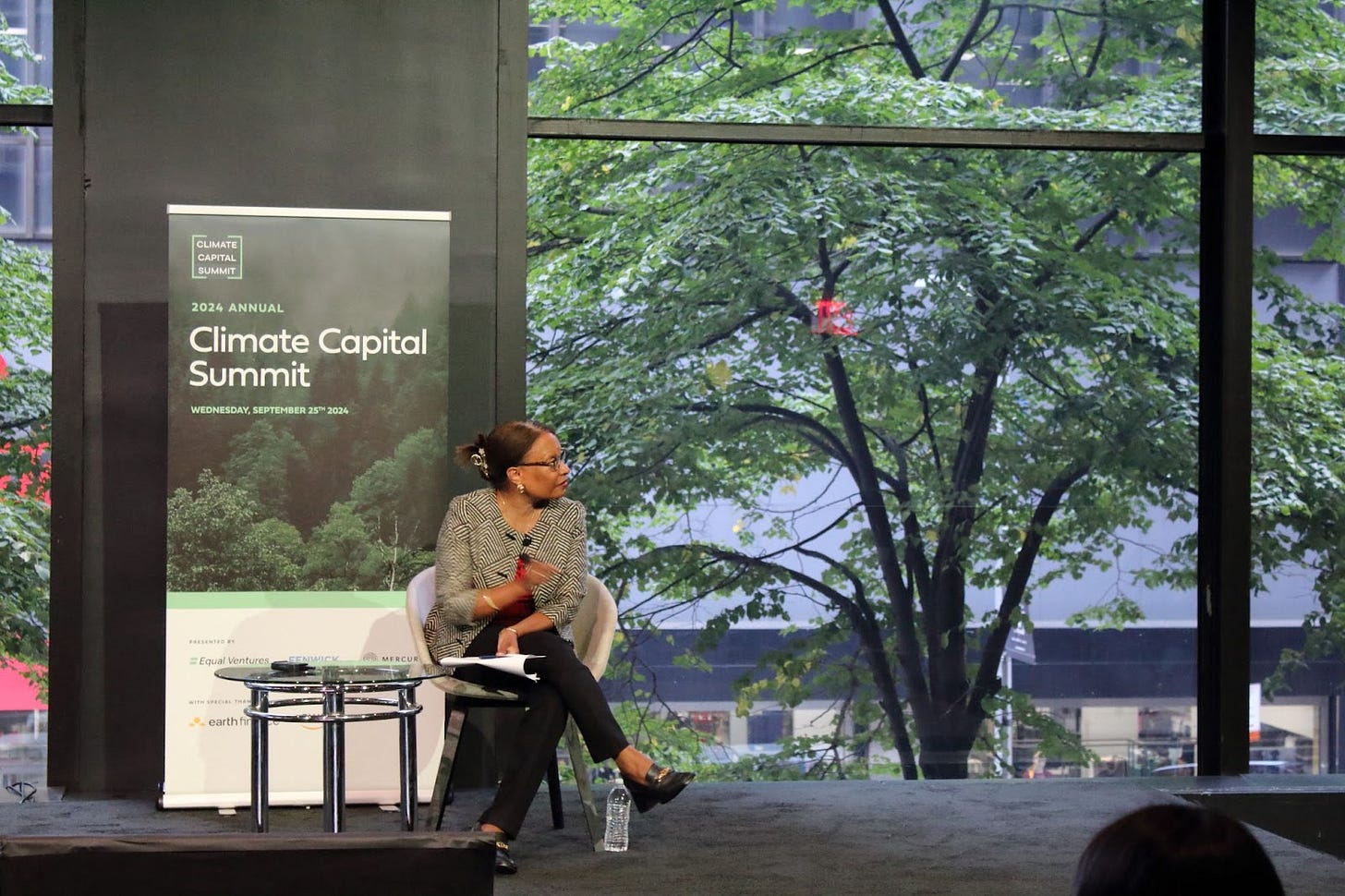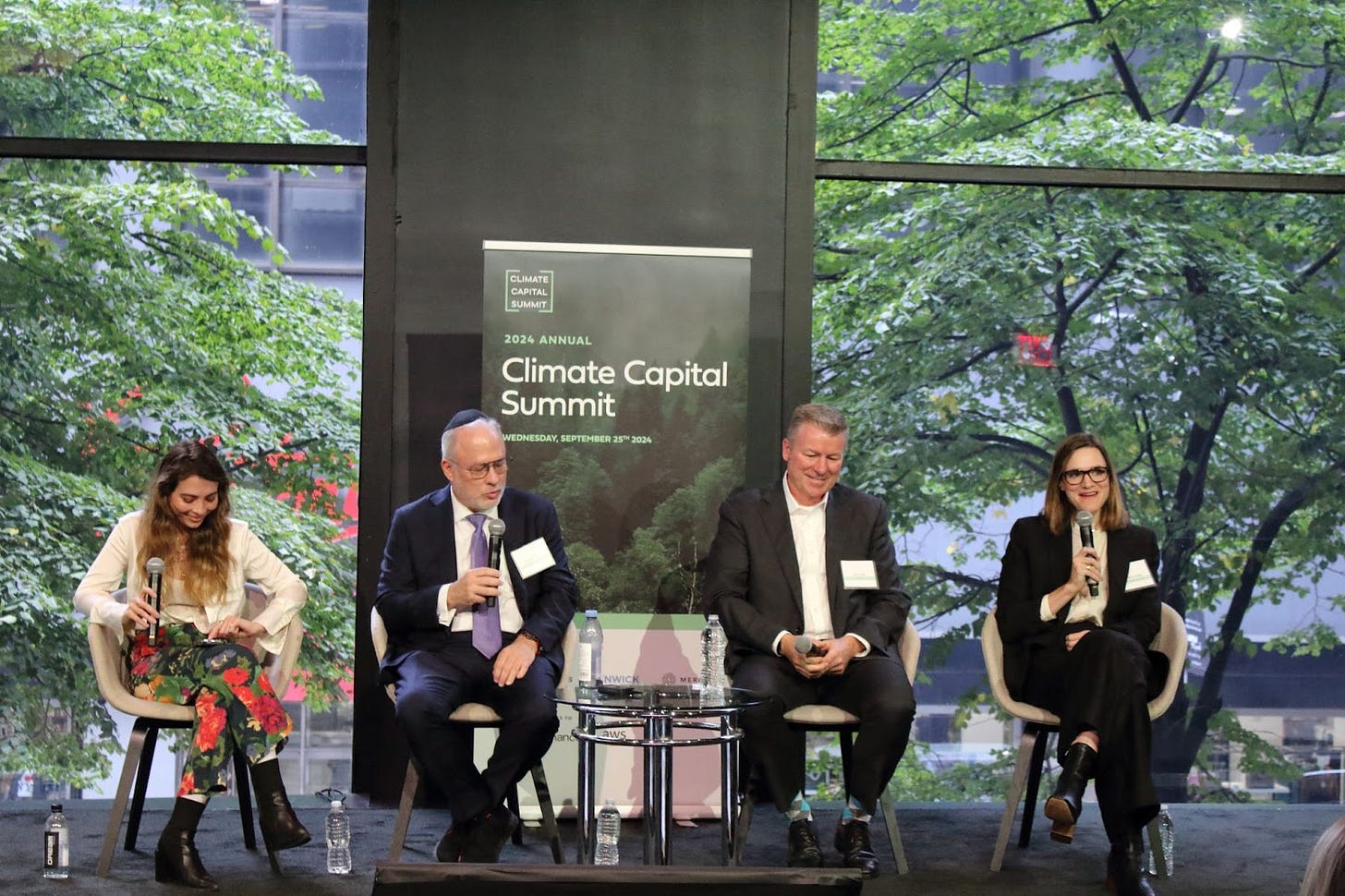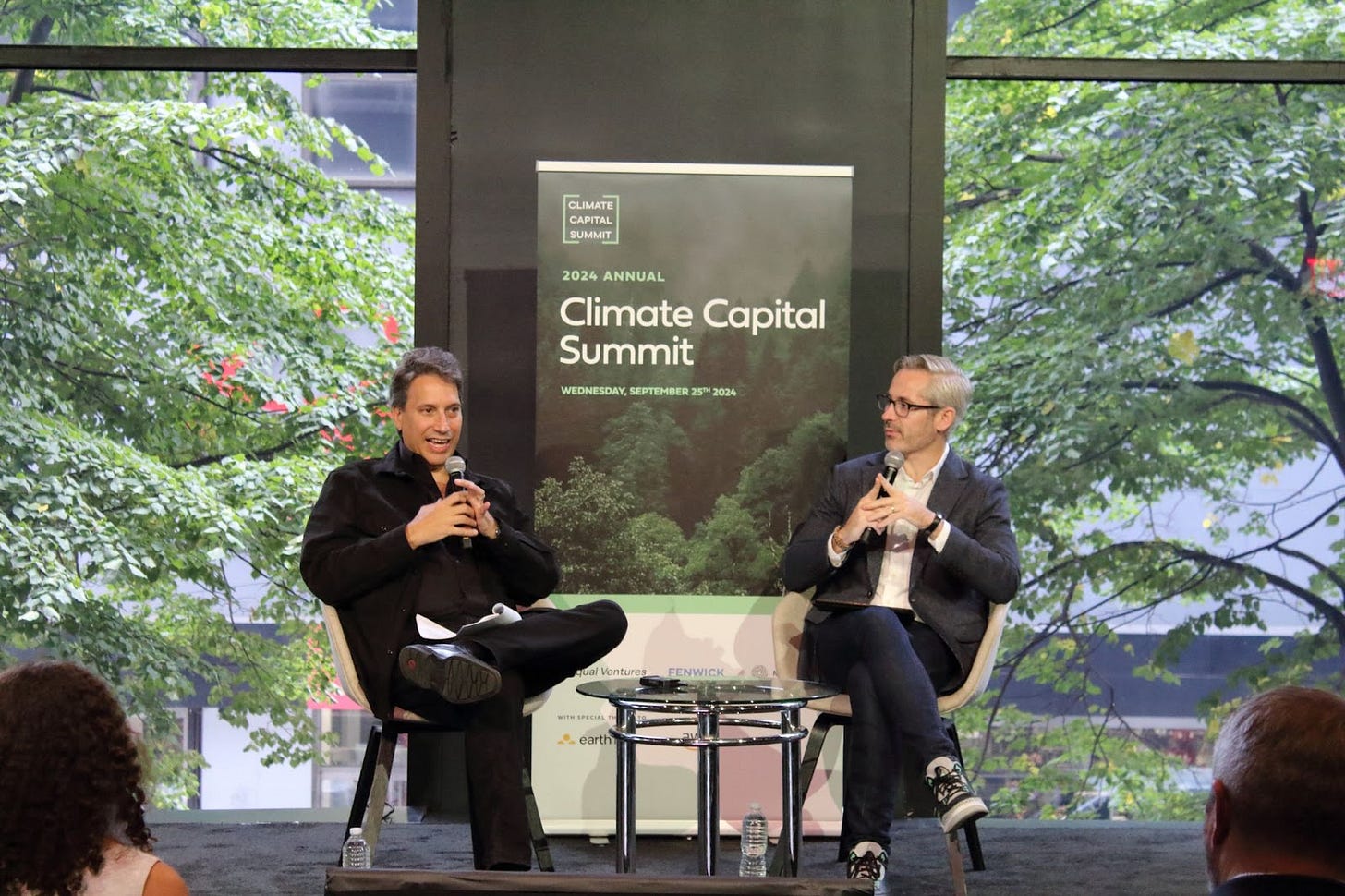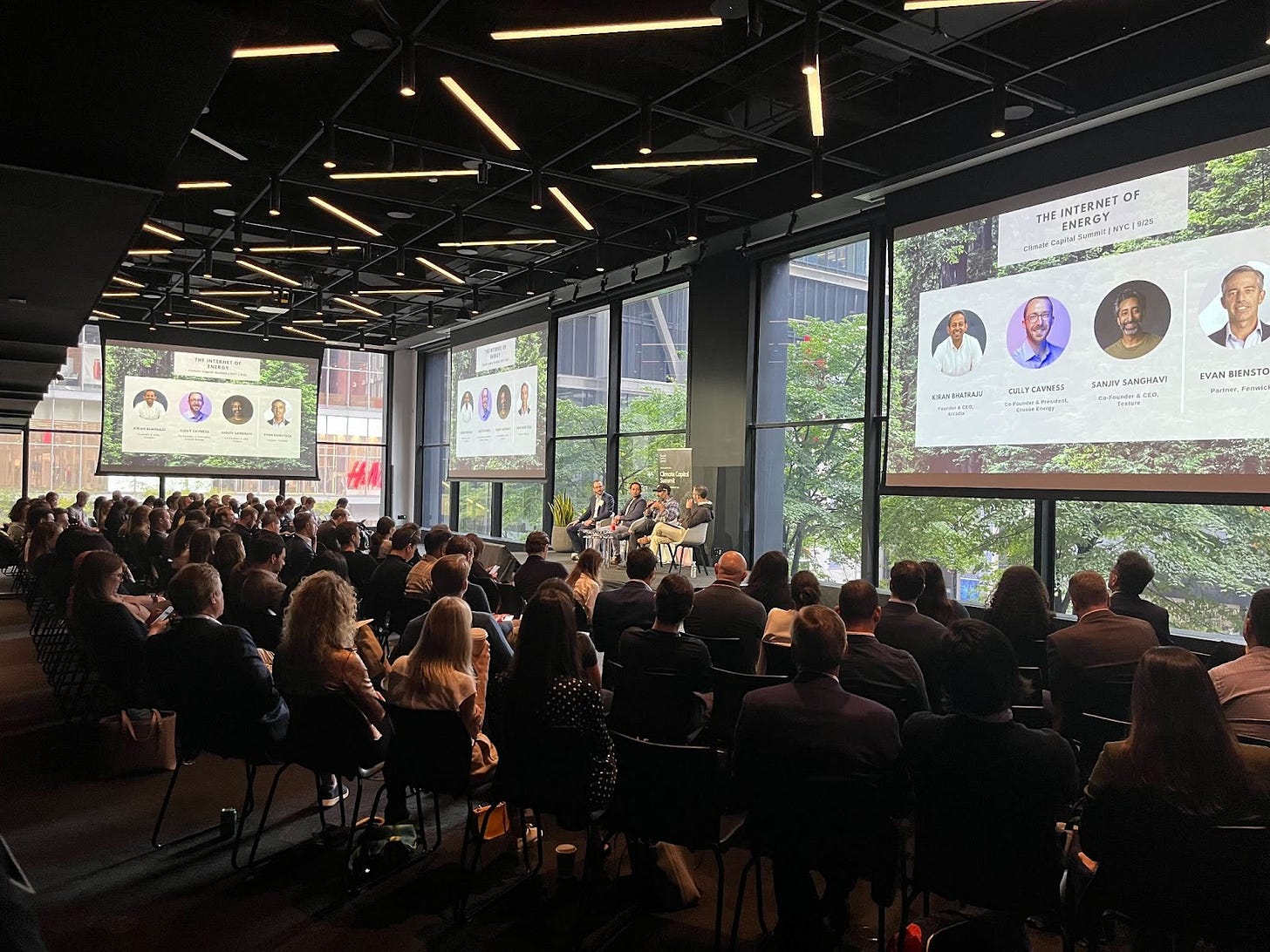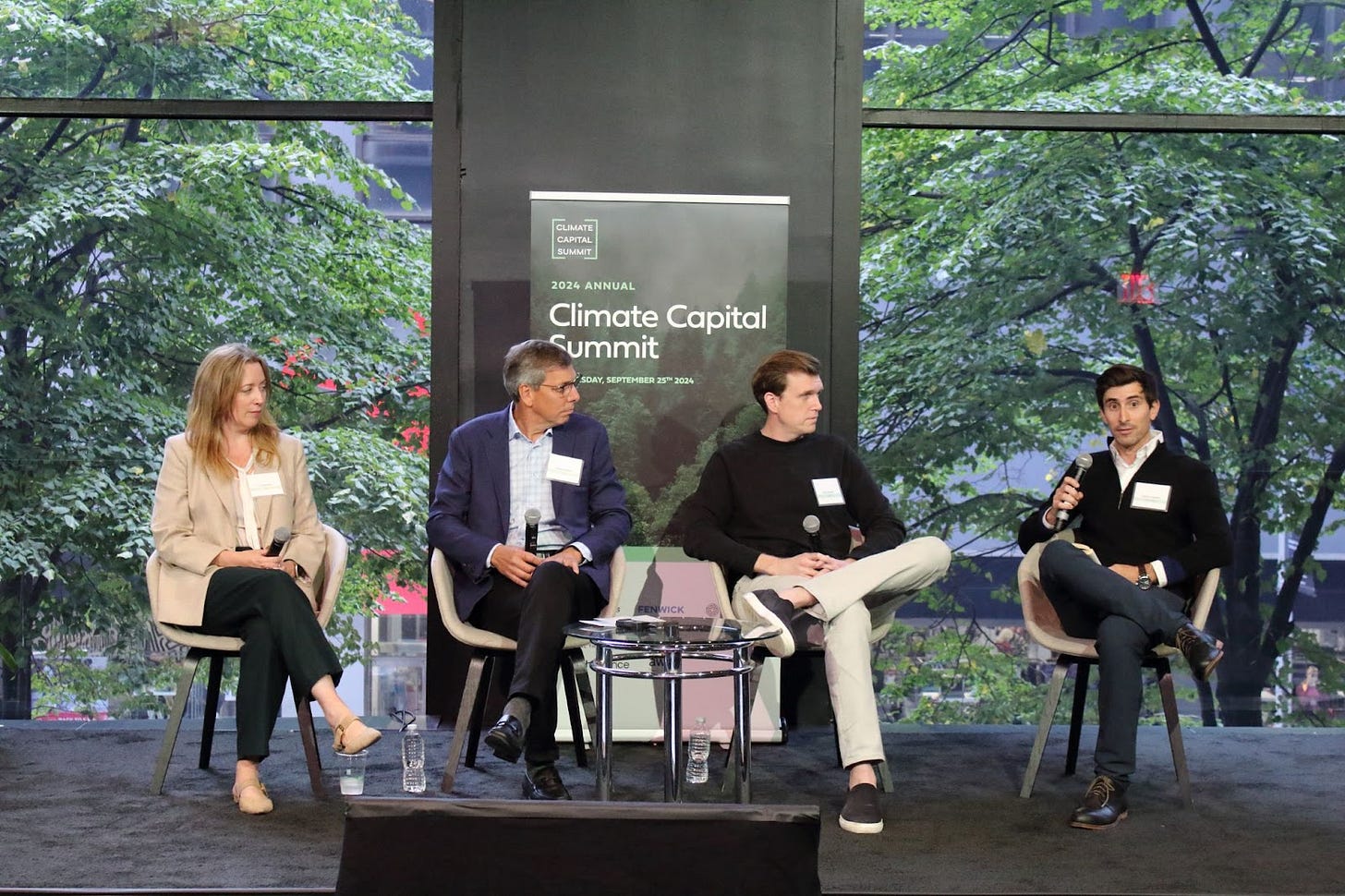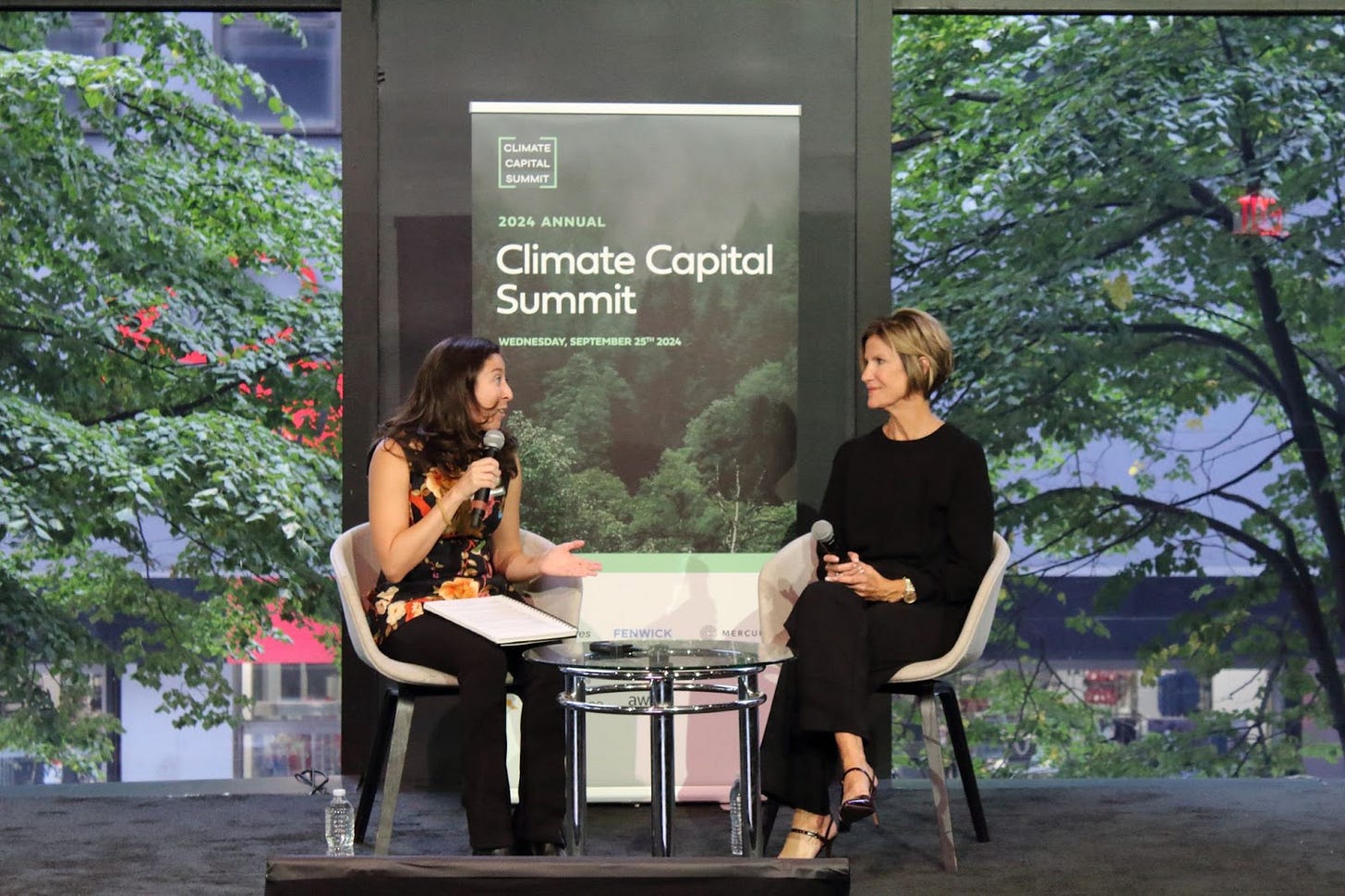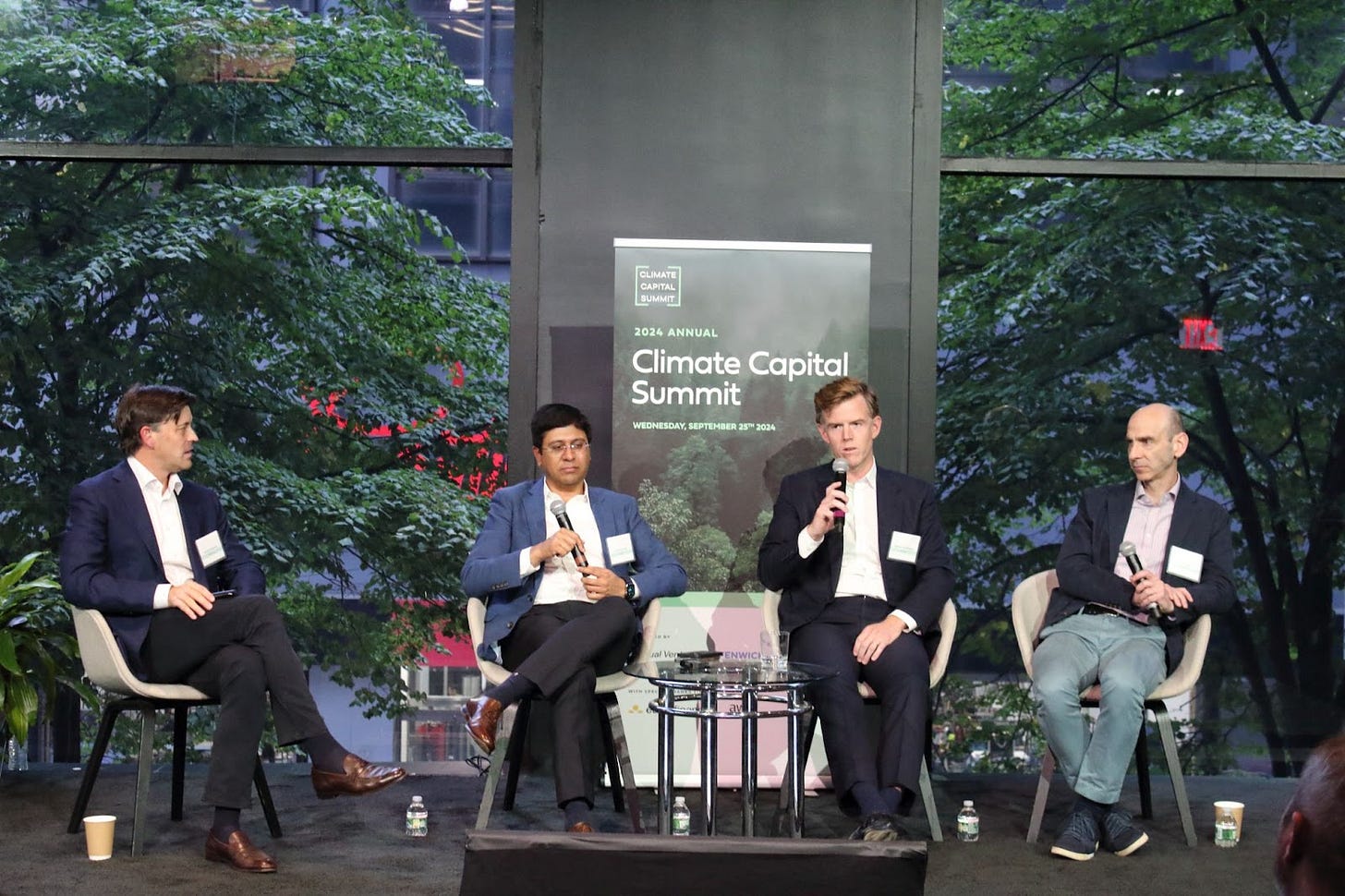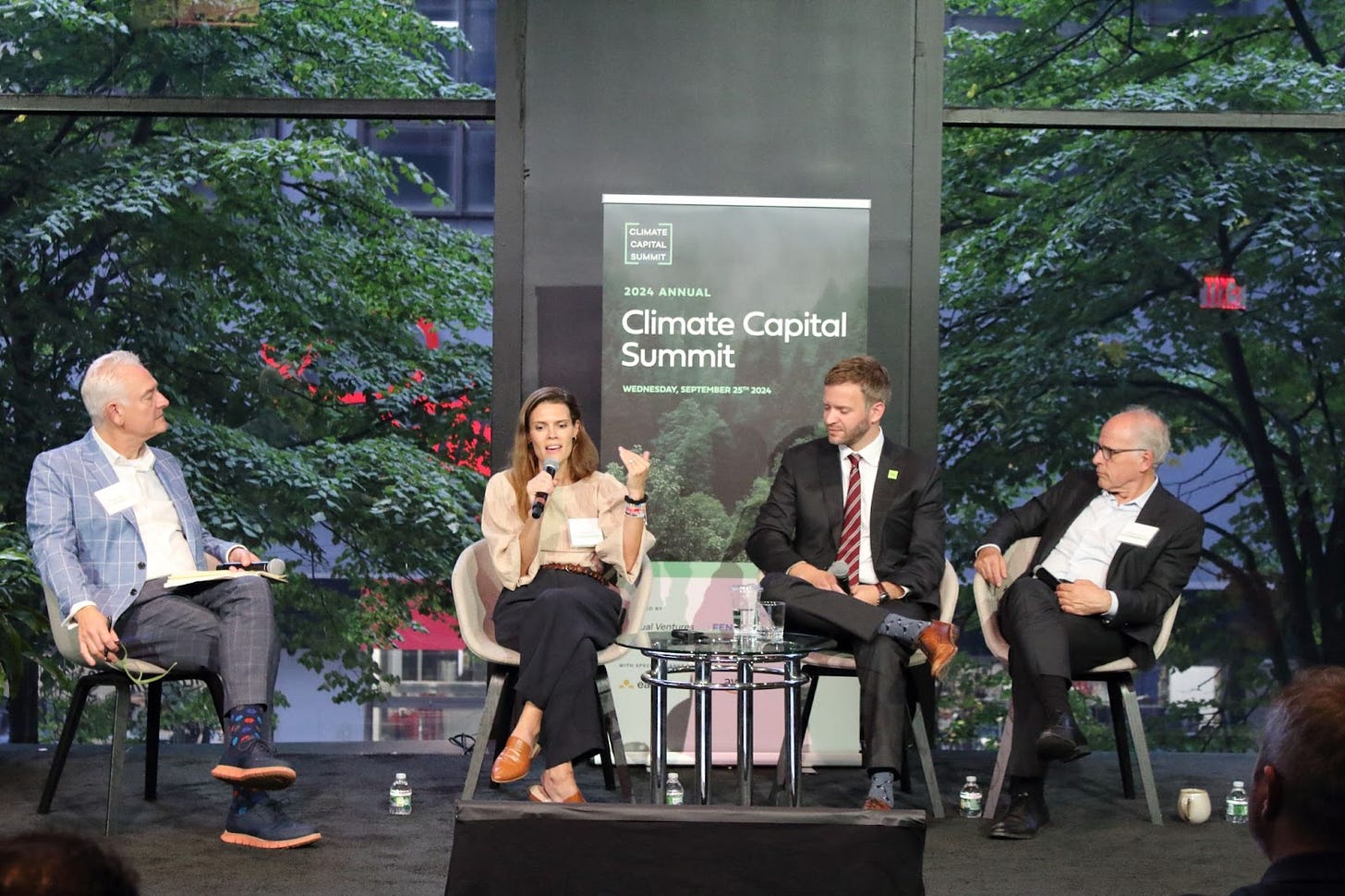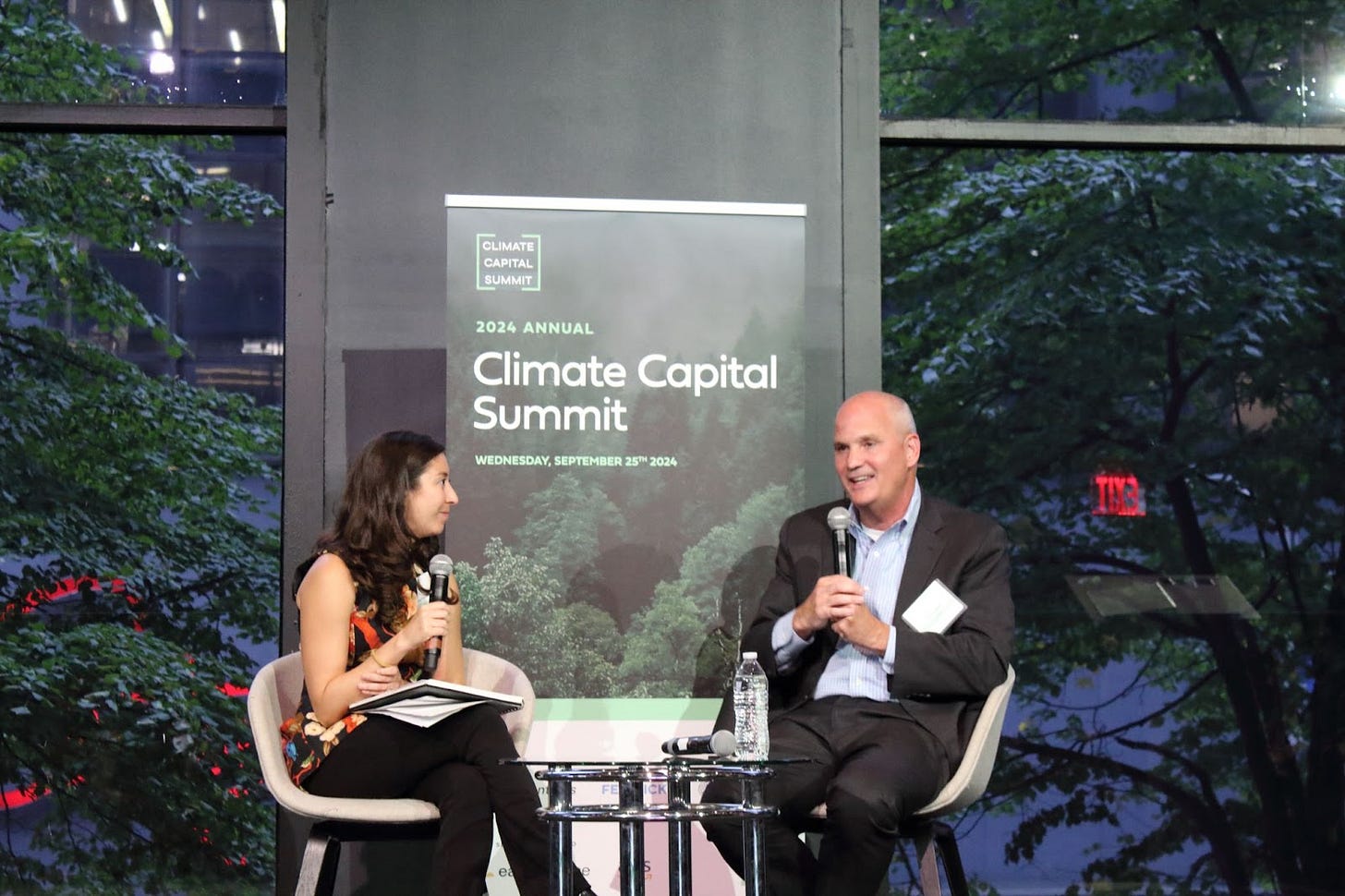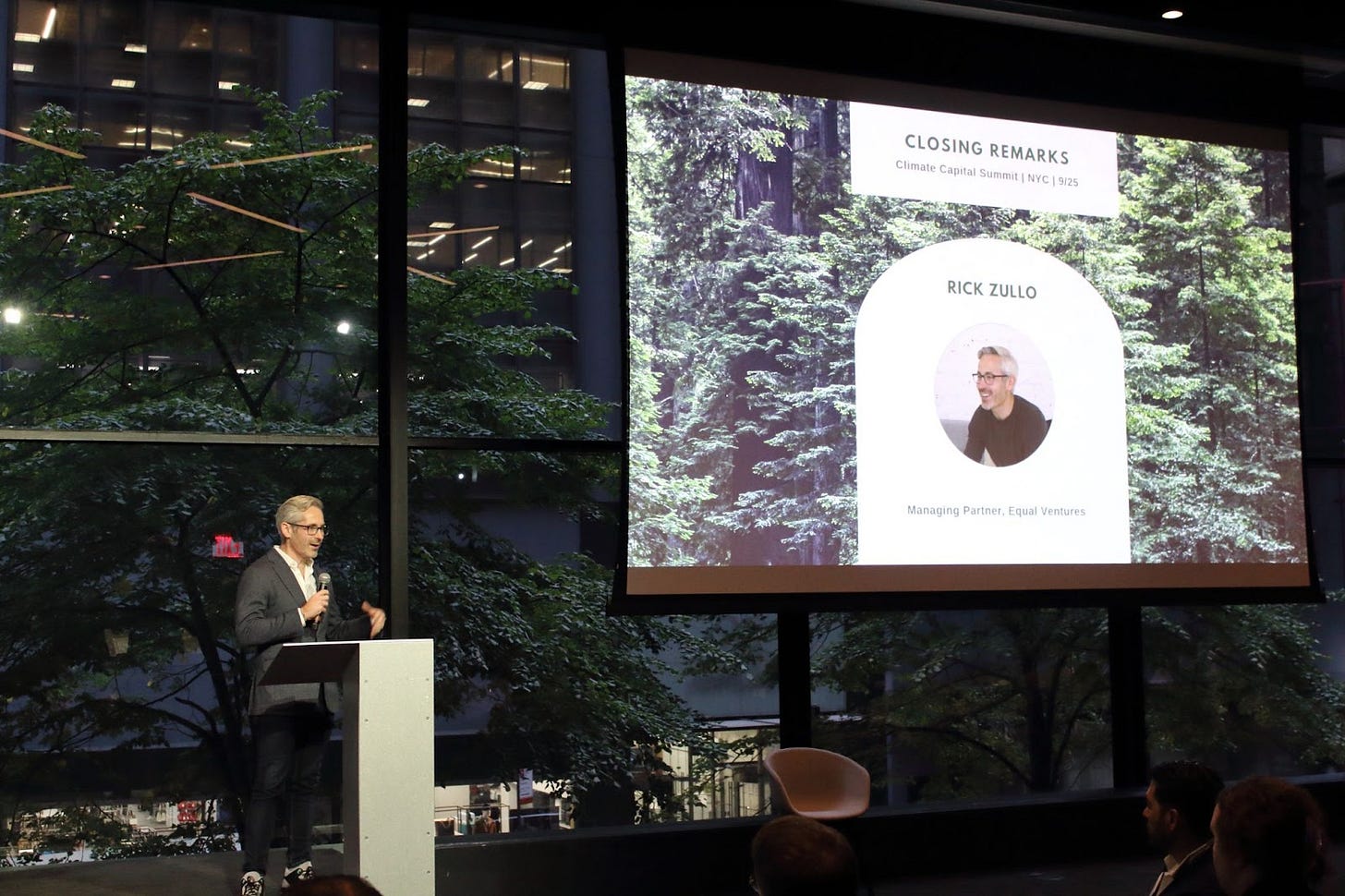Looking Back at the 2024 Climate Capital Summit
Follow the conversation on LinkedIn
1 day, 5 keynotes, 30 speakers, 400 attendees, and an astounding 4,500 people on the waitlist. The second annual Climate Capital Summit hosted by Equal Ventures is officially in the books!
This year, the Climate Capital Summit shifted its focus from last year’s tech-driven discussions to decision-making. The event brought together the world’s largest capital allocators and energy leaders to explore how to evolve and sustain a maturing energy ecosystem—something we frequently discuss at Equal. While today ClimateTech promotes a culture of rapid growth, we must also encourage innovative companies to build the capabilities that will make them dominant in the long term. How do we scale early-stage companies, where large energy corporations are eager to innovate but often slower to act? How do we secure access to later-stage capital, where the capital opportunities are greatest but the funding gap is widest? Bridging the early / late-stage divide is crucial, and this means fostering a network of leaders who can propel these companies to scale. The summit’s keynotes, speakers, and attendees aligned with this vision, showcasing a “keiretsu” of the industry’s top leaders and gatekeepers.
The 2024 Climate Capital Summit brought together a powerful network of keynotes and speakers managing a staggering $600 billion of climate capital and $300 billion of the U.S. federal budget. Public company CEOs with over $60 billion in market capital spoke on stage, while the attendees themselves managed a collective $1 trillion in climate capital.
Key Insights from the Summit:
Opening Remarks - Grace Penders (Climate Lead, Equal Ventures)
We must scale early-stage climate companies and bridge the maturity divide across the ecosystem. The Summit ultimately represents how Equal attempts to put its “keiretsu” approach to work by bringing together our network of innovators, investors and industry insiders for the collective transformation of the sector.
A Fireside with Jonathan Silver - Jonathan Silver (Chair of Global Climate Council, Apollo), Rick Zullo (Managing Partner, Equal Ventures)
Jonathan is a leading clean economy investor and advisor, currently sitting as the Chair of the Global Climate Council at Apollo where he helps guide the investment of up to $100 billion in sustainability-related transactions. In this fireside, Jonathan highlights that we’re still early in the energy transition, and the opportunity lies in scaling existing technologies rather than sinking billions into unproven innovations. Real impact can be made by amplifying solutions that are already making a difference. There is a gap in the market between where the venture market plays and where larger scale allocators operate. While few venture companies are capable of crossing the chasm, those that do could see tremendous defensibility and access to capital.
The Age of Infrastructure - Scott Jacobs (CEO, Generate), Irene Mavroyannis (Managing Director & Global Co-Head of Infrastructure BD, Partners Group), John Rapaport (CIO, Keyframe), Rick Zullo (Managing Partner, Equal Ventures)
Leading firms are using various strategies to invest in infrastructure across the financing stack. Key to all of these firms is the agility necessary to be opportunistic in investing WITHIN a deeply specific thesis. Each of these firms see the macro tailwinds promoting the sector (particularly that in next-gen asset types like batteries, data centers and distribution), but are being creative in their pursuit of alpha. One additional observation was the opportunity to find yield amidst aggregated assets, rather than in monolithic infrastructure projects. Yield amongst large scale infrastructure projects has come down in parallel with the costs of coordinating smaller scale assets (thanks to technology), enabling digital-forward managers to find asymmetric return opportunities.
A Climate Address from Secretary Todman - Secretary Todman (Acting Secretary of the US Dept. of Housing & Urban Development - HUD)
Acting Secretary Todman discussed how the agency is addressing the impact of climate change on the “missing majority” by promoting sustainable and resilient housing solutions. HUD has facilitated these efforts by awarding nearly $1b in grants for energy efficiency and resilience.
The End of Energy Abundance - Neil Auerbach (CEO & Chairman, Hudson Sustainable Group), Doran Hole (CFO & EVP, Stem), Emily McAteer (Co-Founder & CEO, Odyssey Energy), Shelley Golan (Senior Director, Mercury)
The "end of energy abundance" stems from different root causes depending on the context. In the US, aging grid infrastructure is being strained by rising energy demand from data centers—partly driven by AI—and an increasing number of distributed resources connecting to the grid. Permitting reform is needed to streamline investments in new grid infrastructure and base load capacity. In emerging markets, the energy demand driven by a growing middle class, economic development, and an unelectrified population coming online, has far outpaced the grid. These regions have the chance to leapfrog the traditional grid model and meet energy demand with distributed energy from the start, avoiding some of the challenges faced by the US.
A Fireside Chat with Ira Ehrenpreis - Ira Ehrenpreis (Managing Partner, DBL), Rick Zullo (Managing Partner, Equal Ventures)
In this special discussion, we held a fireside with one of the longest standing (and most successful) climate investors in the business. In the discussion, Ira addressed the need to align business goals with climate priorities to level out the roller coaster of commitments to climate. Having seen the industry oscillate through various funding cycles, Ira discussed the need for dedicated pools of capital to target transformational outcomes. He also discussed lessons learned from his experience working with founders like Elon Musk, including the importance of betting on visionary “missionary” founders rather than opportunistic “mercenaries”, given 1) the incredible passion, hard work and perseverance required to navigate an industry redefining transformation as well as 2) the ability to see around the corner for a future others can’t see.
The Internet of Energy - Kiran Bhatraju (Founder & CEO, Arcadia), Cully Cavness (Co-Founder & President, Crusoe), Sanjiv Sanghavi (Co-Founder & CEO, Texture), Moderator: Evan Bienstock (Partner, Fenwick)
The rise of DERs is creating new challenges (and opportunities) in making data usable. Each of these companies is ultimately working with existing stakeholders to enable more data-driven decision-making and to drive waste out of the existing value chain. Clear to all, was how massive, yet how nascent this opportunity is given that many large energy producers / consumers are still early in their digital maturity. As the energy industry’s digital transformation hits the next level of adoption (thanks in part to companies like these), we could see a radically different profile for the industry ahead.
Navigating Climate Risk & Resiliency - Greg Bolino (Head of Global Sustainability Strategy & Assets, JLL), Liz Henderson (Global Head of Climate Risk, Aon), Dan Preston (Co-Founder & CEO, Stealth), Adam Chadroff (Insurance Lead, Equal Ventures)
With climate risk increasingly impacting how businesses operate, we need to employ key strategies for managing it. These risks not only include those to physical infrastructure, but also cases where climate may impact business operations (such as in agriculture or supply chain) or cost containment (improperly hedged energy price risks). These myriad of challenges require sophisticated risk management solutions from emerging POVs that properly understand the nuances of climate risk. Long gone are the days where corporations can deny the impact of climate change, focusing solely on how they’ve operated in the past. For companies to survive and thrive in today / tomorrow’s landscape, they need to be thinking about how climate risk will impact their operations and be proactive in mitigation / resilience efforts to address those risks.
A Fireside Chat with Mary Powell - Mary Powell (CEO, Sunrun), Grace Penders (Climate Lead, Equal Ventures)
In a heartfelt discussion with Mary Powell, it becomes increasingly clear that the need for a people-focused approach to energy is stronger than ever before. Ultimately, addressing climate is about community. From NIMBY (Not In My BackYard) to BANANAS (Build Absolutely Nothing Anywhere Near Anyone), the future of energy must be a customer-led revolution to build the energy infrastructure needed to support our communities. We must embrace climate technologies like solar & storage to power our homes and make energy affordable, resilient, and renewable. Sunrun reached an incredible feat a few weeks ago—1M customers and 45% of all home battery installations. Now, we need to deploy with speed.
Financing the Transition - Saurabh Anand (Managing Director of Infrastructure, Carlyle), Jonathan Glass (Acting Deputy Director for Commercialization, ARPA-E), Spencer Hunsberger (Managing Director, ATLAS SP), Michael Ruehlman (Co-Founder & CEO, Shadow Power)
This discussion focused on the different risk points in financing the energy transition along the capital spectrum ranging from the earliest stages (or as the DOE puts it, “lab to loan”) to the most mature ends of the market. Clear in this conversation (as well as others) were the challenges that large scale allocators have in finding appropriate sources of yield and the need for further innovation in aggregating smaller projects to make them investable. This represents a traditional “crossing the chasm” dynamic in the market, where identifying ways to provide “economies of scale” capabilities (lower cost of capital, securitization, risk management, etc.) to what have traditionally been sub-scale opportunities could present significant economic reward.
Catalyzing Action through Climate Policy - Michael Grossman (CIO, Climate United), Jonah Wagner (Senior Advisor, DOE Loan Programs Office), Lauren Zullo (Managing Director, Jonathan Rose), Reuven Carlyle (EVP, Earth Finance)
This panel discussed the ways the private and public sector are working together to accelerate investment in the clean energy transition. At the Federal level, legislation and funding under the current Administration has grown significantly, especially through the Inflation Reduction Act. The Greenhouse Gas Reduction Fund has awarded $27 billion to subnational governments, nonprofits, and tribes for clean energy investments, including $7 billion to Climate United to catalyze private investment into the decarbonization of the transportation sector, single family homes, and multifamily housing. The DOE’s Loan Program Office is finding and funding projects across a range of technical advancement - from new technologies and demonstration projects to large, scalable deployments. In the private real estate sector, stacking incentives and grants across government programs is complex but necessary and opens new and deeper investment opportunities.
A Fireside Chat with Tim Cawley - Tim Cawley (CEO, Con Edison), Grace Penders (Climate Lead, Equal Ventures)
A lifelong leader in the utilities world, Tim highlights the importance of embracing resiliency to meet the rapidly growing electricity demand in NYC. Sharing findings from their climate change vulnerability study, Con Edison is applying climate data to inform their resilience investments and the numerous projects being deployed to meet growing electricity demand. To address climate change effectively, we must embrace innovative solutions that enhance energy efficiency, promote renewable infrastructure, and support distributed energy resources right here in NYC. It’s a pivotal moment in the utilities industry—utilities must lead the way towards innovation.
Closing Remarks - Rick Zullo (Managing Partner, Equal Ventures)
Why do we do events like this? The answer is simple - TRUST. As the African proverb goes, “if you want to go fast, go alone. If you want to go far, go together.” At Equal, we believe that transformation is never accomplished in a silo and believe that bringing together stakeholders across the ecosystem (innovators, investors and industry) is essential for unlocking the breakthroughs necessary for climate transformation. This level of interdependency is best accomplished with trust and trust is never accomplished through a single data point, but rather through reputations forged in iterative interactions. We believe that events like this (and our broader philosophical approach to bringing the industry together) are necessary in forging those data points and building trust amongst the stakeholders responsible for the energy transition.
A Growing Ecosystem for Climate Action
The overwhelming demand both this year and last year for the Climate Capital Summit speaks to the growing commitment to climate. The diverse range of perspectives, from early and late-stage investors to public and private energy companies to our nation’s policymakers, gives us reason to be optimistic about the ecosystem starting to bridge the divide and come together to protect the planet’s future. The 2024 Climate Capital Summit may be over, but the journey toward creating a sustainable future is maturing and evolving. Let’s continue to push forward with speed and collaboration.
We’re grateful to our sponsors—Fenwick & West, Mercury, Earth Finance, and AWS—for their invaluable support in making this Summit possible. Thank you to everyone who helped make this event a success!
The Equal Ventures Team




